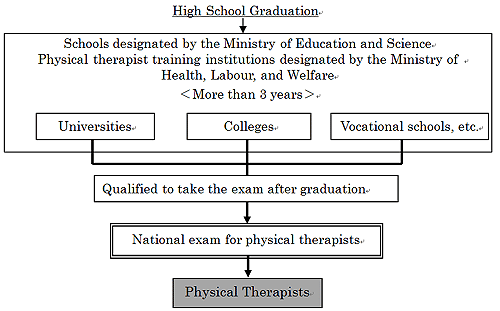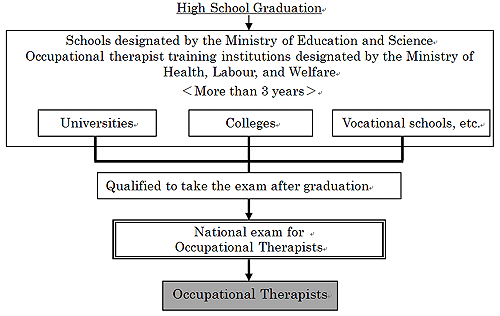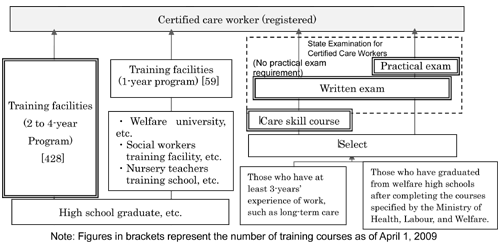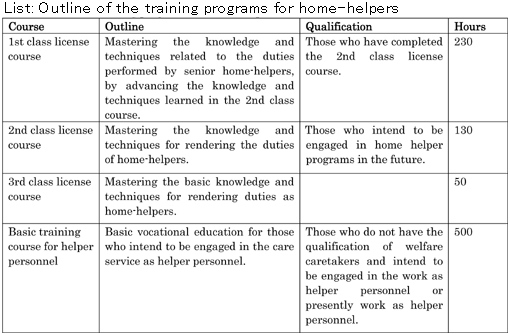Japan Academy of Gerontological Nursing

- OUTLINE OF JAGN
- GREETINGS FROM THE CHAIRPERSON
- INVITATION TO JOIN THE ACADEMY
- LIST OF OFFICERS
- COMMITTEES ACTIVITIES
- GENERAL AFFAIRS COMMITTEE
- EDITORIAL COMMITTEE
- RESEARCH/EDUCATIONAL ACTIVITY PROMOTION COMMITTEE
- INTERNATIONAL EXCHANGE COMMITTEE
- GERONTOLOGICAL NURSING POLICY EXPLORATORY COMMITTEE
- RESERCH PAPER AWARD COMMITTEE
- LIFELONG LEARNING SUPPORT COMMITTEE
- Disaster Support Steering Committee
- GERONTOLOGICAL NURSING IN JAPAN
- OVERVIEW OF NURSING IN JAPAN
- CURRENT SITUATION ON AGING IN JAPAN
- HISTORY OF GERONTOLOGICAL NURSING IN JAPAN
- EDUCATION IN GERONTOLOGICAL NURSING
- NURSES WORKING IN ELDERLY CARE SETTINGS IN JAPAN
- USEFUL LINKS
- LICENSE SYSTEMS, EDUCATIONAL BACKGROUNDS, AND ROLES OF PROFESSIONALS WORKING IN THE JAPANESE ELDERLY CARE SYSTEM
- CONTACT US
- Gerontological Nursing in Japan
- License systems, educational backgrounds, and roles of professionals working in the Japanese elderly care system.
- Physical Therapists
- Definition (According to the Physical Therapists and Occupational Therapists Law):
- Physical therapy refers to the provision of remedial physical exercises as well as other physical measures such as electrical stimulation, massage, warm heat and other physical treatments to the physically disabled in order to allow them to regain their fundamental bodily movement capability. Physical therapists with license granted by the Ministry of Health, Labour, and Welfare provide physical therapy with the title of physical therapist, under instruction from the physician
- Qualification:
- National license
- Education:
- Those who wish to practice professional treatment under the title of physical therapist need to satisfy either one of requirements (1) or (2) below, and pass the national examination held for physical therapists.
- (1) Those who have graduated from a physical therapists' school (4-year university course, 3-year college course, or vocational school)
- (2) Those who have graduated from a foreign school or a training institution related to physical therapy, or have obtained a foreign license equivalent to that of the Japanese physical therapist, and have received approval for practice as a physical therapist from the Ministry of Health, Labour, and Welfare.
- The national examination for physical therapists is held once a year.

- Roles:
- Physical therapy is a remedial science aimed at improving bodily functions, such as muscle strength, range of joint motion, and cooperativeness, by applying movement therapy for functional and organic disorders caused by some diseases or injuries (including sports-related) based on inspection, measurement, and evaluation. It is also aimed at alleviating pain and improving the circulation using warm heat, water, beam of light, electricity, etc.
- For those whose physical capabilities remain limited, remedial treatments include providing instructions for improving basic movements and activities of daily life, selecting welfare equipment to overcome disadvantageous elements in social life, renovate housings, coordinating environments, home care, etc.
- In recent years, prevention and control of adult diseases and disorders have also come under the purview of physical therapy.
- Occupational Therapists
- Definition:
- Occupational therapy:
- To provide remedial instructions to the physically or mentally disabled engaged in craftwork, or other tasks, in order mainly to improve their applicative motion capability and socially practical ability.
- Occupational therapists:
- They obtain licenses from the Ministry of Health, Labour, and Welfare, and practice occupational therapy with the title of occupational therapists under instruction from the physician.
- Qualification:
- National licence
- Education:
- Those who wish to practice as occupational therapists need to satisfy either one of requirements (1) or (2) below, and pass the national examination for occupational therapists.
- (1) Those who have graduated from an occupational therapists' school (4-year university course, 3-year college course, or vocational school)
- (2) Those who have graduated from a foreign school or a training institution related to occupational therapy, or have obtained a foreign license equivalent to that of the Japanese occupational therapist, and have received approval for practice as an occupational therapist in Japan from the Ministry of Health, Labour, and Welfare.
- The national examination for occupational therapists is held once a year.

- Occupational therapy for the elderly:
- It provides remedies and training by utilizing various physical activities for the elderly who have various diseases and functional deterioration. Regarding psychological and social issues such as loss of motivation in life and social roles, and isolation from society due to aging, guidance and assistance are provided for them to live their lives more objectively in environments of the elderly.
- Objectives:
- 1. Working on bodily functions
- This is aimed at preventing deterioration of muscle strength, joint movements, and cardiopulmonary function necessary for actual life to maintain and improve the physical conditions through promoting work activities.
- 2. Working on everyday life
- Training and guidance are provided on the ways of providing care suited to individuals for promoting bodily movements necessary for everyday lives such as having meals, changing clothes, and bathroom activities, and taking a bath, etc., to acquire regular and appropriate rhythms of their lives.
- 3. Working on the mental conditions
- This is aimed at vitalizing mental activities such as motivation in life as well as easing concerns caused by mental and physical deterioration and loss of purpose in life, to maintain mental stability.
- 4. Working on "motivation in life"
- It encourages the elderly to recapture motivation in life and live spontaneous lives with hobby activities, making the most of their individual living environments and experiences and opportunities to express themselves.
- 5. Working on social activities
- This is aimed at expanding the scope of the elderly lives, as they are encouraged to enjoy exchange with other people and recapture a sense of their roles in the group by participating in group activities and events.
- Actual activities:
-
- Training of basic bodily motions
- Training of bodily motions in everyday life such as having meals, changing clothes, eliminating, taking a bath, etc.
- Making and adaptation of a splint(hand device)
- Inventing and making of equipments for self-help
- Introducing instruments for helping life
- Holding recreational events
- Giving guidance to their families
- (Source: Ministry of Health, Labour and Welfare. http://www.mhlw.go.jp/english/ )
- Certified Care Workers (kaigo fukushi shi)
- Definition:
- A certified care worker is a person who provides, as his/her profession, personal care including assistance in bathing, bathroom activities, meal intake and others, and also provides care guidance to the persons needing care and the caregivers.
- Education:
- Those who have completed high school or higher education and have graduated from training schools designated by the Ministry of Health, Labour and Welfare can function as certified care workers; in addition, those who are engaged in personal care-related occupations for 3 years or longer can also become certified care workers upon registration after passing the State Examination held for Certified Care Workers.

- (Source: Ministry of Health, Labour and Welfare home page. http://www.mhlw.go.jp/kouseiroudoushou/shikaku_shiken/kaigohukushishi/index.html)
- Home-helpers
- Roles:
- It is a forefront frontline job in the home help program where home helpers visit the houses of the elderly and disabled and provide care services (assisting in meals intake, taking a bath, bathroom activities, changing clothes, moving from one place to another, etc.) and assistance services (assisting in cooking, washing clothes, cleaning, shopping, etc.) for household chores.
- The home help program is run by the entities commissioned by municipal governments according to the nursing-care insurance system. There are various types of legal entities such as municipal social welfare councils, medical corporations, commercial corporations, co-ops, agricultural cooperatives, NPO's, etc.
- Qualification:
- To become a home-helper, it is necessary to complete the "home helper training course" based on a standard curriculum established nationwide. The entire training course comprises the basic training course for helper personnel (for 500 hours) and the training courses for home-helpers: the courses for 1st class license (for 230 hours), 2nd class license (for 130 hours), and 3rd class license (for 50 hours).

- (Source: Nihon home helper kyougikai homepage. http://www3.shakyo.or.jp/hhk/index.htm)
- Care Managers(Kaigo Shien Senmonin)
- Definition:
- Care Managers receive the certificate of 'Care Manager' for possessing specialized knowledge and techniques to provide assistance necessary for individuals in need of nursing care to live independent lives. They coordinate communication and services with commissioned service companies so that those in need of nursing care could consult with the care managers to use appropriate services depending on their physical and mental conditions.
- Qualification:
- Those who wish to apply for registration as care managers and the issuance of the certificate of 'Care Manager' must have job experience set out by the ordinance of the Ministry of Health, Labour, and Welfare and complete the practical training course for care managers after passing the practical training examination for care managers.
- The certificate is valid for 5 years from 2007, and the workers must undergo a refresher training before further renewal.
- Roles:
- The duties of care managers are as follows:
-
(1) To confirm the conditions of the users and analyze issues (assessment): They visit the users' houses and confirm the physical conditions, the bodily motion capabilities in everyday life, family situation, etc., of the users (2) Design of a care plan: They hold meetings with those who will be in charge of the services and devise care plans. (3) Assistance for fulfilling the procedure for using the service: They coordinate communication with the service providers so that services would be provided based on the care plans. (4) Managing the implementation situation of the care plan: They manage the implementation of the plan continuously to see whether the services have been provided according to the care plan and whether there are any changes in the physical or mental conditions of the users. They visit the houses of the users to interview them at least once a month. - (Source: Ministry of Health, Labour and Welfare. http://www.mhlw.go.jp/english/ )
